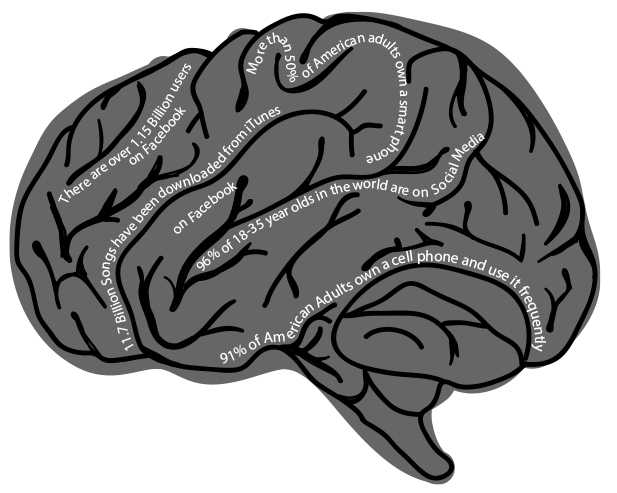Technologically speaking…
Whether it is the new iPhone or just the simple act of scrolling through Facebook, escaping technology is virtually impossible. The effects of this phenomenon on the brain, although significant, remain unfamiliar to most.
January 27, 2015
Older generations passed their time reading or playing outside, but with the rise of technology, this has greatly shifted for today’s generation. While reading stories from the tangible pages of a book promotes focus and imagination, the internet trains the brain to scan information quickly and productively. The shift from books to a computer screen is not necessarily harmful in all aspects, it just alters the way our brains develop. Technology transforms the visual stimulant and shortens our attention span.
Neuroimaging research shows that screen time tampers with our productivity as well as our emotions and brain functions. Studies reveal that getting too much screen time at a young age may lead to decay of the processing part of the brain that plans, organizes, and prioritizes information. In addition, the part of the brain that develops empathy and compassion is affected and consequently alters the way children react to emotional situations.
According to the New York Times, students that are allowed to use their laptops to surf the internet during class do not remember the teacher’s lessons and do not perform well on exams compared to those that are not online. English teacher, Mrs. Brew, sees the technology as a distraction in her classroom, but also a reality in the future. “I know that when I have my students online, they will be open to a lot of distractions. In the real world this is also a temptation, so this won’t come as a shock to them. We are a college preparatory school, so when our students go to college I think they will be more responsible users than those who do not have the same experience,” Mrs. Brew said.
BSM students, with the privilege of having laptops during the school day, are especially prone to this truth. “When I am on my computer in class it is usually because I don’t feel like paying attention. It is just to keep my hands busy. I hear what the teacher says but I am not really paying attention,” freshman Ben Larson said.
On the positive side, research has shown that the internet is not making children unintelligent, but rather they are able to think in different ways than previous generations. Even though children are less capable of remembering
information because they can quickly look it up online, they are more successful at remembering where to find things, which is unique to this era. Researchers from University of Rochester in New York believe that now, instead of retaining all information, technology allows our brains to process information more complexly––with critical thinking and problem solving.Although distracting, technology offers a variety of learning advantages. Reflecting on BSM’s ability to host online school under extreme weather conditions, math teacher Mr. Bowler appreciates the use of technology in the classroom. “When technology is used correctly, it is an incredible tool. Some kids do get sucked into the gaming vortex, and that can be real dangerous for those kids, but the ability for us to have online school is great. I can post my videos and have a chat group. A lot of schools can’t do that, and for me, the smartboard has been a revelation. I can save my notes and post them on haiku the same day,” Bowler said.
I is important for younger generations to understand the effect of these new devices as it is proven that technology affects the brain significantly. The fast-growing technology has numerous benefits, undoubtedly, but one must be aware of the negative consequences that come hand–in–hand with the positive benefits.






































![Teacher Lore: Mr. Hillman [Podcast]](https://bsmknighterrant.org/wp-content/uploads/2025/03/teacherlorelogo-1200x685.png)












